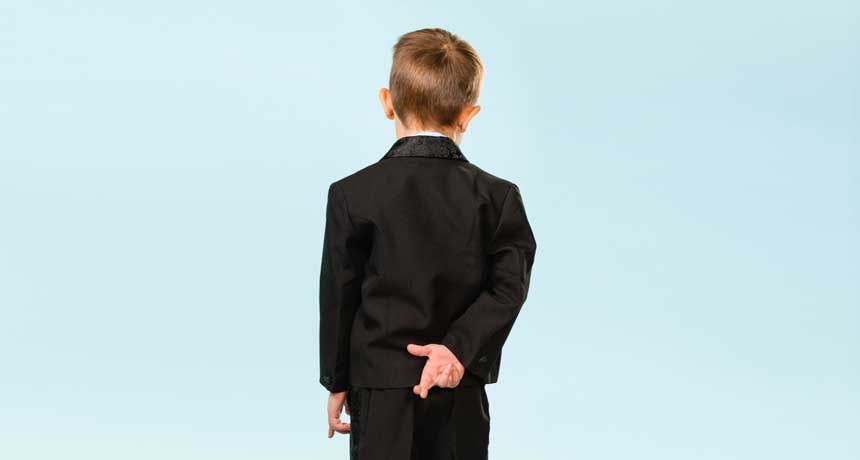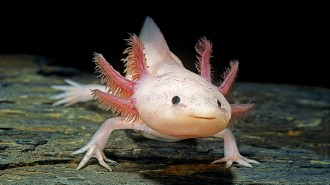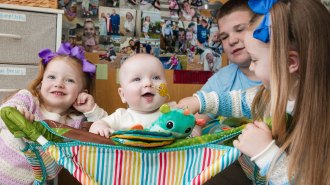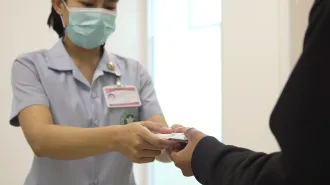Telling kids lies may teach them to lie

After being lied to, children were more likely to tell a whopper, a new study finds.
jarih/iStockPhoto
- More than 2 years ago
Most parents claim they want to teach their children the importance of honesty. But the truth is, most parents are lying liars.
Adults, and not just parents, tell all sorts of lies to children for all sorts of reasons. We lie to make children behave. “If you don’t go to sleep, the troll under the bed will get you.” We lie to make kids feel better. “Oh sweetie, your drawing is beautiful!” Sometimes, we lie just for fun. My father-in-law, for instance, used to swear to my husband that hoverboards were a real thing — It’s just that they were pulled off the market because they were too dangerous. Ah, the good old days.
A 2009 study found that parental lying is rampant. In that study, college students recalled some of the egregious lies their parents had told: You have a limited amount of air and if you keep talking, it will run out; if you play with fire you’ll wet the bed; if you don’t go to sleep early, a scary man will take you away from mommy and daddy.
Some University of California, San Diego psychologists wondered whether such lies actually influence children. Are kids who get lied to more likely to lie themselves? The answer, the researchers reported March 17 in Developmental Science, is a big whopping yes.
Leslie Carver and Chelsea Hays invited 186 kids between the ages of 3 and 7 into their lab. Upon arrival, some of the kids were told a bald-faced lie: “There is a huge bowl of candy in the next room. Want to go get some?” When the kids got to the candyless room, the researcher admitted that it was a ruse to get the kid into the room. When the other group of kids arrived, they were told simply that a fun game awaited them in the next room.
Next came the honesty test. With their back to the researcher, the kids had to guess which toy went with a particular sound. After several softballs (a toy Elmo saying “Tickle me,” and a stuffed Cookie Monster saying “I love cookies”), the kids heard a snippet of the song “Für Elise.” Just after that, the researcher left the room to take a phone call, leaving the children in perfect positions to cheat and sneak a look at the mysterious toy.
Most kids peeked at the toy, but those who had heard the candy bowl lie were a little more likely to cheat, a camera revealed. Later, the researcher returned and asked kids whether they had peeked. Of the kids who peeked, those between the ages of 5 and 7 who had been duped with the candy bowl lie were more likely to lie themselves and say they didn’t peek than the kids who didn’t get lied to, the researchers found. Of the peekers, almost 90 percent of 5- to 7-year-old kids who had been lied to told a lie themselves. Slightly more than 60 percent of 5- to 7-year-old kids who had not been lied to lied to the researcher about whether they peeked.
But this effect was true only for older kids. Lying to a 3- or 4-year-old didn’t make a difference in those kids’ behavior, Carver and Hays found. Younger kids might not be sophisticated enough to recognize a lie, or they might attribute it to a mistake instead of a purposeful deception.
For the older kids, it’s not clear why lying to a child makes that kid more likely to lie, Carver says. A simple explanation is that the children imitate how they were treated themselves. Another possibility is that the children lose trust in the person as soon as they realize they’ve been lied to. “The child says, ‘This person is a liar so I can lie too,’” Carver says. Alternatively, the entire lab might be tarnished by the lie. “The child might say, ‘Oh, this is a place where everybody lies, so I can lie,’” Carver says. The researchers are currently testing those ideas by having one experimenter do the lying and another play the toy game with the child.
The experiment involved a stranger lying to the children. The results might be different if a parent did the lying. The result of a parental lie might be more innocuous than a stranger lying, because the kid and parent have already built up a long history of trust. Or it could sting more, since a lie coming from such an important person might be a larger violation of trust, Carver says. “I could really easily see it going both ways,” she says. “My guess, and this is mostly based on being a parent, not on any actual research, is that when parents lie to kids, the effect would be smaller,” she says. But the ethics of making parents lie to their children in a lab make the necessary studies tricky.
The results from this study can’t say much about the effects of parental lying, but they do offer something for parents to consider.
“I don’t know that we can say to parents that if you lie to your kid, your kid is going to grow up to be a liar. There’s a lot we don’t know,” she says. “But it ought to strongly encourage anybody to not lie to children if they’re concerned about those kids growing up and not lying and cheating themselves.”
I know this study will make me think twice about telling Baby V about the bygone era of hoverboards.
Follow me on Twitter: @lssciencenews







